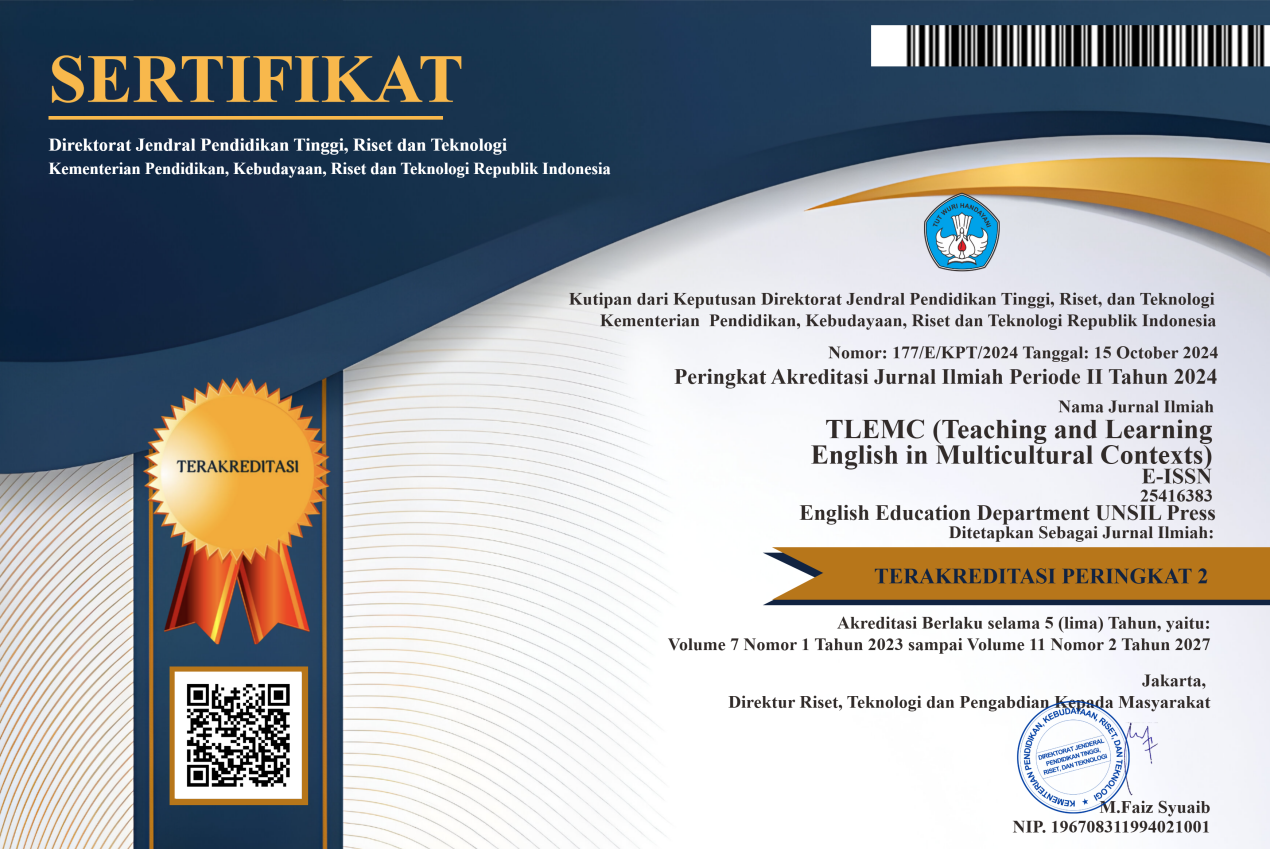Exploring EFL Students’ Perspectives: Integrating Mind Mapping as a Cognitive Tool in Academic Writing Class
Abstract
The purpose of the study is to find out the EFL students’ perspective on the use of mind mapping as a cognitive activity in an academic writing class in the English education study program at Pattimura University. This study took 3 students (1 male and 2 females) from an English education study program. The In-depth interview is the instrument of data collection with qualitative as the research method. The result shows that the EFL students’ perceptions toward mind mapping seemed to have positive responses toward their language learning with several benefits based on their experience during academic writing class, such as the writing of students was more well-structured, increased students writing grades in academic writing and the beneficial using mind mapping made them becomes motivated in writing something. However, in the process, there were several difficulties that some students had to face when using this strategy such as they were to determine the sub-points and doing the mind mapping took more time, energy, and thoughts, and they were confused about where to start making a mind map. The study suggests that using mind mapping in writing classes, with proper support and training, can help students improve their writing skills. Encouraging its use in other subjects and adapting teaching based on feedback can make mind mapping a valuable tool for better learning and academic success.
Keywords: Mind Mapping, Cognitive Tool, Academic Writing
Full Text:
PDFReferences
Al Kamli, H. M. (2019). The effect of using mind maps to enhance EFL learners' writing achievement and students' attitudes towards writing at Taif University.
Alqasham, F. H., & Al-Ahdal, A. A. M. H. (2022). Effectiveness of mind-mapping as a digital brainstorming technique in enhancing attitudes of Saudi EFL learners to writing skills. Journal of Language and Linguistic Studies, 17(2).
Amansyah, F., Nur, S., & Anas, I. (2023). Digital mind mapping as a pedagogical tool to support the student’s business plan writing performance. JOALL (Journal of Applied Linguistics and Literature), 8(2), 433-453.
Astiantih, S., & Akfan, S. S. (2023). Utilizing Concept Maps to Enhance Students’ Writing Skills. Journal Of Languages And Language Teaching, 11(3), 433-446.
Astuti, W., Maghfiroh, A., & Palupi, R. E. A. (2020). Enhancing students’writing ability by implementing problem-based learning method at the english department students in muhammadiyah university of ponorogo in academic year 2019/2020. Edupedia, 4(2), 155-161.
Azizan, N., Abdullah, S., Anuar, N., & Maznun, M. D. (2022). Learners’ Perceptions and Attitudes Towards the Use of Mind-mapping Technique in Enhancing their Understanding of Short Stories. International Journal of Academic Research in Business and Social Sciences, 12(10), 2847-2859.
Basri, N., & Syamsia, S. (2020). The effect of applying mind mapping method in writing descriptive text. Langua: Journal of Linguistics, Literature, and Language Education, 3(2), 36-56.
Buzan, T. (2010). Buku Pintar Mind Mapping Untuk Anak. Jakarta: PT Gramedia Pustaka Utama
Cohen, L., & Manion, L. (2007). Research Methods in Education. Routledge.
Fahmi, F. (2019). Implementing mind mapping technique to develop students ‘writing of procedure text (A Classroom Action Research at The Ninth Grade Students Of SMP Islam Ruhama Cireundeu In Academic Year 2019/2020) (Bachelor's Thesis, Jakarta: FITK UIN Syarif Hidayatullah Jakarta).
Landicho, C. J. B. (2020). Secondary school students' attitudes and practices toward research writing and reporting in science. Issues in Educational Research, 30(1), 156.
Mardiah, M., Hendra, H., & Hastina, N. (2019). Aplikasi Edraw Mind Map Bagi Guru Sd Negeri 050702 Kecamatan Secanggang Kabupaten Langkat. Jurnal Pengabdian Kepada Masyarakat, 2(2). https://doi.org/10.31604/jpm.v2i2.71-77
Miles, B. & Huberman, A. (1994). Qualitative Data Analysis. Thousand Oaks, California: SAGE Publications, Inc.
Purba, R., Silalahi, M., & Kurniawan, B. (2021). The effect of mind mapping strategy on students ’. The effect of mind mapping strategy on students’ writing ability. Ridwin, 02(01), 4–11
Rachmawati, V., Maghfiroh, A., & Mufanti, R. (2017). Basic questioning with picture in writing class: Is it effective? Edupedia, 1(1), 1. https://doi.org/10.24269/ed.v1i1.164
Risdayanti, r. (2023). The use of mind mapping technique on improving students’writing skill at 8 th grade of smpn 2 suli (doctoral dissertation, institut agama islam negeri (iain) palopo).
Silulu, R., & Nasir, V. (2022). The use of mind mapping technique in improving students’ writing ability at SMA Al-Khazanah Tidore Kepulauan. Jurnal Ilmiah Wahana Pendidikan, 8(8), 283-291.
Silvani, D. (2020). Learning through Watching: Using Animation Movie to Improve Students’ Writing Ability. Journal of English Language Teaching and Linguistics, 5(2), 233-247.
Tatipang, D., Oroh, E. Z., & Liando, N. V. (2021). The Application Of Mind Mapping Technique To Increase Students’reading Comprehension At The Seventh Grade Of Smp. Kompetensi, 1(03), 389-397.
Wahid, J. H., & Sudirman, S. (2023). The Effect of Mind Mapping Technique on Students' Writing Skills. Journal of Languages and Language Teaching, 11(1), 39-49.
Yahrif, M. (2021). The Effectiveness of Using Mind Mapping Technique In Teaching Recount Text To Increase The Students’writing Ability. Kumpulan Artikel Pendidikan Anak Bangsa (Kapasa): Jurnal Pendidikan, Sosial Dan Humaniora, 1(1), 27-35.
DOI: https://doi.org/10.37058/tlemc.v8i1.10827
Refbacks
- There are currently no refbacks.
INDEXED BY:
This work is licensed under a Creative Commons Attribution-NonCommercial-ShareAlike 4.0 International License.
![]()
TLEMC (Teaching and Learning English in Multicultural Contexts)
Program Studi Pendidikan Bahasa Inggris
Fakultas Keguruan dan Ilmu Pendidikan
Universitas Siliwangi
Jl. Siliwangi No. 24 Kota Tasikmalaya - 46115
email: tlemc@unsil.ac.id





